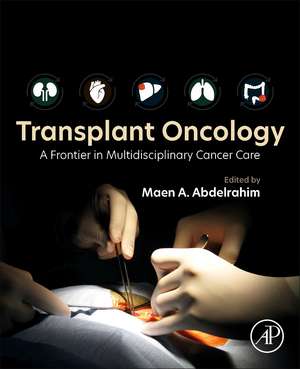Transplant Oncology: A Frontier in Multidisciplinary Cancer Care
Editat de Maen A. Abdelrahimen Limba Engleză Paperback – 8 noi 2024
Sections cover applications of transplant medicine and surgery in oncology to improve patient survival outcome and quality of life. The book gives insight into anticancer strategies, such as initiating studies in genomics and cancer immunogenomics based on new insights in liver cancer.
In addition, it describes how the adoption of surgical transplantation techniques in oncology has improved conventional resection and bridged the gap between tumor and transplant immunology. This is a must have reference for all those that want to be familiar and up-to-date with the dynamic changes in the field including practicing physicians, scientists, and trainees.
- Illustrates the concept and history of transplant oncology as an evolving field for the management of hepatocellular carcinoma
- Discusses the utility and safety of immunotherapy in the transplant setting
- Summarizes the utilization of immune checkpoint inhibitor therapies in pre-and post-liver transplants for HCC patients and discusses the assessment of immune checkpoint inhibitor regulators that might determine liver transplant outcomes
- Highlights new and evolving topics including the utilization of immunotherapy in special patient populations as well as the clinical updates on new concepts in the field, including treatment and rejection assessment
Preț: 801.23 lei
Preț vechi: 1050.66 lei
-24% Nou
Puncte Express: 1202
Preț estimativ în valută:
153.33€ • 157.03$ • 127.55£
153.33€ • 157.03$ • 127.55£
Carte tipărită la comandă
Livrare economică 11-25 martie
Preluare comenzi: 021 569.72.76
Specificații
ISBN-13: 9780443219016
ISBN-10: 044321901X
Pagini: 360
Dimensiuni: 216 x 276 mm
Greutate: 0.45 kg
Editura: ELSEVIER SCIENCE
ISBN-10: 044321901X
Pagini: 360
Dimensiuni: 216 x 276 mm
Greutate: 0.45 kg
Editura: ELSEVIER SCIENCE
Cuprins
Section I: Transplant Oncology: An Evolving Field in Cancer Care
1. Transplant Oncology: concept, history, and evolution
2. Prehistory of Transplant Oncology Era
Section II: Transplantations for Oncological Indications
3. Hepatocellular Carcinoma
4. Cholangiocarcinoma and liver transplantation
5. Transplantation for Oncological Indications: Colorectal Cancer Liver Metastases
6. Liver transplantation for neuroendocrine neoplasms liver metastases
7. Hepatoblastoma
Section III: Transplant Oncology and Immunotherapy
8. Transplant Oncology and Immunotherapy: Immunotherapy and liver transplants
9. b. Immunotherapy and kidney transplant
10. Immunotherapy and Hematopoietic Stem Cell Transplantation
11. Immunotherapy in the Era of Transplant Oncology: Risks and Complications
12. Immunotherapy and immunosuppressants: Considerations in the clinical practice
Section IV: Transplant Oncology and Precision Medicine
13. Molecular profiling and Next-Generation Sequencing applications in transplant oncology
14. Circulating tumor DNA (ctDNA) as a new and evolving tool in solid organ transplantation
15. Cell-free DNA (cfDNA) biomarkers for solid organ transplant rejection
16. Artificial intelligence in transplant Oncology
Section V: Solid Organ Transplant and Cancers Considerations
17. De Novo malignancy Post Liver Transplantation: Recent Insights on Epidemiology and Surveillance Strategies
18. History of cancer and transplant clearance: Considerations prior to transplantation
Section VI: Surgical Aspects of Transplant Oncology
19. Robotic Surgery for Liver Cancer and Applications in Liver Transplantation
20. Resection versus Transplantation for Intrahepatic and Hilar Cholangiocarcinoma
21. Liver transplantations for secondary cancers: surgical considerations
22. New strategies for two-stage hepatectomy
23. Living Donor Liver Transplantation
24. Patient characteristics and evaluations prior to liver transplantation
25. Challenges of liver transplantation for transplant oncology indications
26. Future of transplant oncology of the liver
1. Transplant Oncology: concept, history, and evolution
2. Prehistory of Transplant Oncology Era
Section II: Transplantations for Oncological Indications
3. Hepatocellular Carcinoma
4. Cholangiocarcinoma and liver transplantation
5. Transplantation for Oncological Indications: Colorectal Cancer Liver Metastases
6. Liver transplantation for neuroendocrine neoplasms liver metastases
7. Hepatoblastoma
Section III: Transplant Oncology and Immunotherapy
8. Transplant Oncology and Immunotherapy: Immunotherapy and liver transplants
9. b. Immunotherapy and kidney transplant
10. Immunotherapy and Hematopoietic Stem Cell Transplantation
11. Immunotherapy in the Era of Transplant Oncology: Risks and Complications
12. Immunotherapy and immunosuppressants: Considerations in the clinical practice
Section IV: Transplant Oncology and Precision Medicine
13. Molecular profiling and Next-Generation Sequencing applications in transplant oncology
14. Circulating tumor DNA (ctDNA) as a new and evolving tool in solid organ transplantation
15. Cell-free DNA (cfDNA) biomarkers for solid organ transplant rejection
16. Artificial intelligence in transplant Oncology
Section V: Solid Organ Transplant and Cancers Considerations
17. De Novo malignancy Post Liver Transplantation: Recent Insights on Epidemiology and Surveillance Strategies
18. History of cancer and transplant clearance: Considerations prior to transplantation
Section VI: Surgical Aspects of Transplant Oncology
19. Robotic Surgery for Liver Cancer and Applications in Liver Transplantation
20. Resection versus Transplantation for Intrahepatic and Hilar Cholangiocarcinoma
21. Liver transplantations for secondary cancers: surgical considerations
22. New strategies for two-stage hepatectomy
23. Living Donor Liver Transplantation
24. Patient characteristics and evaluations prior to liver transplantation
25. Challenges of liver transplantation for transplant oncology indications
26. Future of transplant oncology of the liver
